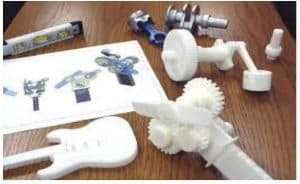A prototype is all about creating a new product. It is the first stage of any kind of product development and design. However, when you set out to opt for plastic prototypes, what plastic would you choose? In fact, if you are a new manufacturer, it can indeed get overwhelming to choose the best plastic for your manufacturing needs. Let us check out the types of plastics and what kind of products will be best suited for in today’s post.
The right choice of plastic will be dependent on what product are you planning to manufacture. The material you choose for the plastic prototypes can vary a lot. The following guide may help you make the right choice.
Vessels or Containers
Are you planning the prototypes of vessels or containers? In that case, Polypropylene should be your best choice. It is one of the excellent options used in food grade materials. It is quite impervious to chemicals, does not react with oils and is quite heat resistant. The polyethylene is yet another famed plastic that finds immense use in plastic prototypes.
Transparent Equipment
Transparent products like lenses can be manufactured with Acrylic. It can be one of the best options for shatterproof windows. You can also use it for situations where you would want to focus on rigidity and abrasion resistance. It can be used in those circumstances where you need high tensile strength, better polish and affordable when used in large quantities.
Rubber
One of the best options for rubbers is TPU or Thermoplastic polyurethane. It can be one of the excellent options for power tools, caster wheels, and other sports goods. The high abrasion resistance and shear strength are what would make it a great choice for industrial appliances. However, it absorbs moisture and may be an issue in terms of manufacturing.
Tool Cases
If you are looking for stronger tear resistance and high resistance to impact, the acrylonitrile butadiene styrene or commonly referred to as ABS is the best you can go with. The material is quite lightweight. It can be quite expensive but offers you a longer life. The hardness and toughness of the material would make it an exceptional choice.
Mechanical Objects
Nylon is one of the best and most common resins you would find for manufacturing mechanical parts. It is highly resistant to wear and tear and also to abrasion. It offers you better mechanical properties at higher temperatures. Polyoxymethylene is another option that can be best used for mechanical parts.
Well, do note that these options are only outlined as commonly used plastics for manufacturing. Of course, these materials can be used in combinations between themselves or can be combined with other products like glass, stabilizers and similar other options.
Of course, engineering plastics come with special properties in their own right. You would definitely be looking ahead to an excellent durability. We expect the growth of 3D printing along with plastic prototypes in the days ahead, and we believe you will agree with us.

